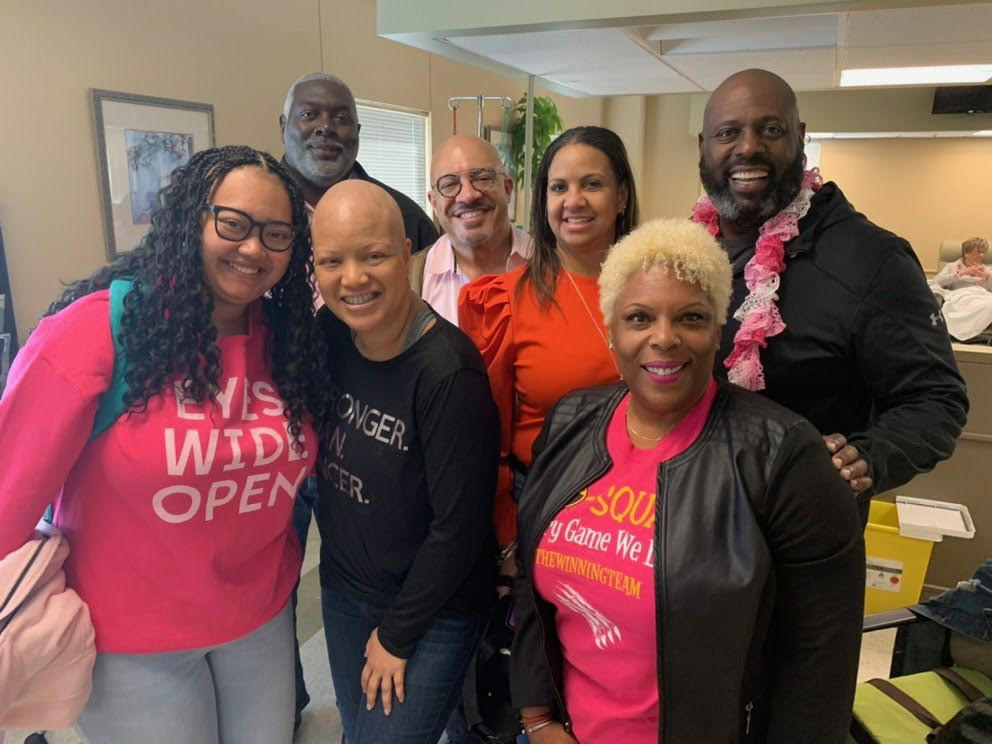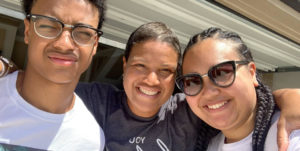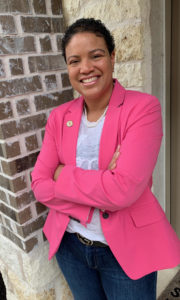Full Circle: Family, Friends and Community

Every two minutes, a woman in the United States is diagnosed with breast cancer. In that moment, her life changes forever.
Merriam-Webster defines full circle as a series of developments that lead back to the original situation or to a complete reversal of the original position — usually used in the phrase come full circle. My life came full circle on Tuesday, October 15, 2019 when I heard my normally poetic, laughter-providing menopause physician say in a soft voice, “You have breast cancer.” I was shocked and I began to weep. Not a quiet, soundless weep, but the type of weeping that is a cry out for your mother to hold you, rub your head, and tell you everything will be okay. The irony was I had prepared for hearing those words my entire adult life.
My circle started to form in 2003 when I lost my mother to this same horrible disease. She was a young 60-year-old with a vibrant, active life. She left behind three children, her aging parents, four grandchildren, and my son who she was never able to meet. It was then that I began preparing to hear the words “You have cancer.”
After my mother’s diagnosis, I became driven to make a difference to support other women going through breast cancer. It was important to me to honor her and do what I know she would have done. I have dedicated my personal and professional life to cancer education. I was the American Cancer Society’s Regional Director of Health Initiatives, I have visited oncology centers and hospitals throughout Texas, talking to cancer patients, and hearing their stories of survivorship. I worked in the Breast and Cervical Cancer Early Detection Program for the State of Texas. I was later named the Vice President of Programs for Livestrong, all while serving as a board member and volunteer for Susan G. Komen. In the African American community, I was often called the “cancer lady”—I pushed the importance of mammography and early detection to churches, community organizations, and anyone else who would listen.
Fast forward to my diagnosis. All kinds of things went through my 48-year-old mind but the main focus was my children. How do I tell my son who may hear me crying? How do I tell my daughter in her first year of college in Virginia going through midterms? How do I tell my significant other, my brother, my sisters, my dad, my aunts, uncles, cousins, nieces, nephews, friends, and even my ex-husband? What do I say? How do I say it? As I muttered the words, “I have breast cancer,” I made a promise to myself that nobody should have to make in their lifetime, “I’m going to be just fine. I have no other choice .”
My first appointment was the day after my diagnosis, and it was full steam ahead. I saw my breast surgeon and my oncologist had multiple exams and scans, scheduled my port placement the next week, and started chemotherapy that Friday.
I was overwhelmed. But let me tell you who I am. I am the mother who is kinda cool, the baby to my siblings, the crazy aunt who tells jokes all the time, and the friend who keeps the party going. I love my family intensely. I say all this to give you a visual picture of my doctors’ appointments. At the first one, there were nine of us. If we didn’t have at least four people at chemotherapy, there was something wrong. I love them for loving me unconditionally. They held me up during this most difficult time.
Going through this was tough for all of us, especially for my friends who live out of town. I am a Chicago girl and my childhood besties still live there. They traveled to support and love on me. They are my extended family who loves me in spite of myself. I am also blessed with an amazing network of friends here in the Austin area. The usual suspects, my sorority sisters in Alpha Kappa Alpha, my Link sisters in the Austin Chapter, my work family at the Department of Family and Protective Services, my alumni family of Southern University, my church family, and more have supported me, fed me, prayed for me and comforted me.

Full circle is my story. I went from serving others to now being served. I am happy to report that I am cancer-free and will continue this journey with medical treatments and daily medication. Susan G. Komen continues to support women like me in this fight. Join me in supporting their efforts to end breast cancer in our community.

Article written by Kenya Johnson, Breast Cancer Survivor
Rhythm gets disrupted when moments like this change our lives. Kenya’s story is important because it demonstrates that breast cancer doesn’t discriminate. She knew her family history, lived a healthy lifestyle, understood the facts and figures, and even worked for cancer organizations, but the disease didn’t care. African American women in the United States die from breast cancer nearly 40% more than Caucasian women. Susan G. Komen is committed to reducing this percentage by fighting to achieve breast health equity for African American women.
COVID-19 has impacted the number of people scheduling their cancer screenings. This Breast Cancer Action Month, get back into the rhythm and schedule your mammogram today. Don’t wait — your life may depend on it.






